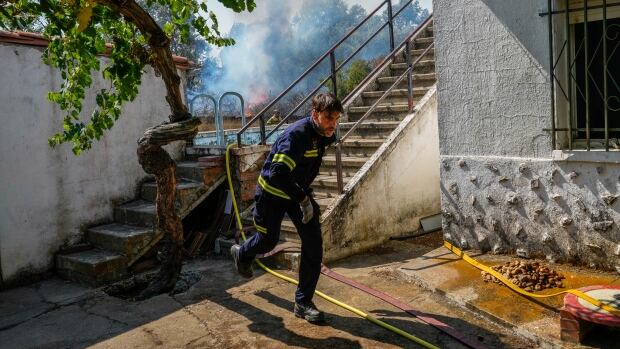
International project to name heat waves met with skepticism, intrigue
CBC
As record heat waves sweep their way across North America and Europe, a new international project is experimenting with naming heat waves to increase public awareness of their severity.
The Adrienne Arsht Rockefeller Foundation Resilience Center, a Washington, D.C.-based group studying climate resiliency, is running a pilot program to see whether a naming system for heat waves will affect the public's perception — and actions — during periods of intense heat.
The World Economic Forum reports that countries all over the world are experiencing record-breaking heat waves this year. Rising global temperatures are making heat waves more common, severe, and lengthy.
"Heat, unlike other natural disasters, is silent and often not seen. Therefore, it's extra important that we raise awareness around what heat can do, because it's actually one of the deadliest natural disasters that we face," said Kurt Shickman, director of extreme heat initiatives at the centre.
"And so that disparity between how dangerous they are, versus how visible they are, really requires branding and it requires more effort to raise people's profile of this issue."
The program launched in six cities including Los Angeles, Miami, Milwaukee and Kansas City, Mo., in the United States as well as Seville, Spain and Athens, Greece. In July, Seville was the first city in the world to name a heat wave, calling it Zoe, according to Shickman.
"There was a lot of media coverage around that and a lot of attention paid to that," said Shickman.
"That's important, not just for attention to the system, but actually, to get people aware that this is a dangerous time."
The World Meteorological Organization (WMO), a United Nations agency, said they are supportive of classifying heat waves but are not certain how naming a heat wave works scientifically. The WMO also questioned whether the system could be confusing for the public.
"The most important issue here is that, in most countries, only designated national agencies such as the weather services or public health agencies have a national responsibility to issue official heat warnings," said Bob Stefanski, head of applied climate services at the WMO.
"We just want to make sure that these independent practices are coordinated, and don't risk disrupting the civil protection protocols that are already in place," said Stefanski.
In Canada, some researchers agree with the WMO and are skeptical of how a naming system will communicate the severity of heat waves.
"I'm really, really against it. I think that hearing, you know, the heat wave, Zoe or Joey is about to come your way. It doesn't really drive fear in my heart. I think that I don't necessarily pay attention to it," said climatologist David Phillips. Phillips is a long-time researcher with Environment Canada but shared his personal view with the CBC.
He also pointed out the reason a naming system was developed for tropical storms was for clear communication. Multiple storms can be happening in close proximity, or have the potential to collide.

 Run 3 Space | Play Space Running Game
Run 3 Space | Play Space Running Game Traffic Jam 3D | Online Racing Game
Traffic Jam 3D | Online Racing Game Duck Hunt | Play Old Classic Game
Duck Hunt | Play Old Classic Game